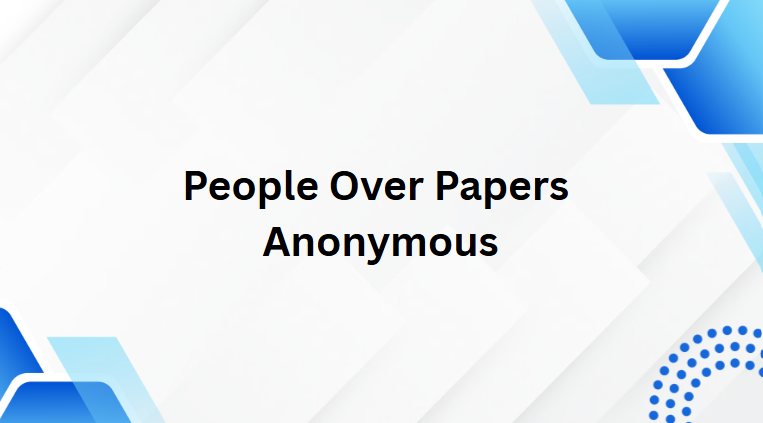“People Over Papers Anonymous” is a strong idea that says humans should matter more than documents, rules, or forms. This phrase is often heard in workplaces, schools, hospitals, and legal systems. It reminds us that every person has feelings, needs, and rights that should come before paperwork. In a world full of forms and systems, this idea pushes us to treat others with respect and care first.
This article explains what “People Over Papers Anonymous” means, where it is used, and why it is important today.
What Does People Over Papers Anonymous Mean?
The phrase shows a belief: humans first, paperwork second.
It means:
- Respect people before giving importance to documents
- Focus on real needs, not only rules
- See individuals as humans, not numbers
- Support dignity and kindness in organizations
The word “Anonymous” adds a message that anyone can be part of this value system. It is not owned by one group. It is a wide movement of empathy and fairness.
Why Is This Approach Needed?
1. People Have Emotions
Paper forms cannot show a person’s stress, fear, or hope. Real conversation can.
2. Systems Can Be Unfair
Some rules make life harder for people without documents or with missing information.
3. We All Want to Be Seen
Everyone wants to be treated as a complete human, not just paperwork.
4. Better Support and Services
Hospitals, schools, and companies work better when they understand humans first.
Where Is People Over Papers Anonymous Used?
Healthcare
Doctors and nurses use this idea to listen to patients more. A patient is more than a file number.
Education
Teachers try to know students personally. A grade sheet does not show talent or intelligence fully.
Immigration Support
Advocates for migrants say people should be helped even if paperwork is slow or missing.
Workplace and HR
Employees deserve understanding even when rules are strict.
Social Services
Welfare workers focus on improving lives instead of only checking forms.
Examples in Real Life
- A teacher gives extra time to a student struggling at home
- A doctor talks gently with a patient before asking for documents
- A company helps an employee who lost their papers instead of punishing them
- An immigration officer treats a refugee with care, not suspicion
These examples show kindness and honor in action.
Core Values of People Over Papers Anonymous
Here are the main values ranked by importance:
1. Human Dignity
Every human deserves respect.
2. Empathy
Understanding others’ feelings builds trust.
3. Inclusion
No one should be left out because of missing papers.
4. Fairness
Rules should not harm the weak.
5. Communication
Talk to people. Listen. Help.
These values build a healthy and happy community.
How Can We Follow This Idea?
You can practice “People Over Papers Anonymous” in daily life:
✅ Ask someone how they feel before asking for a document
✅ Listen to others with patience
✅ Be flexible when rules create stress
✅ Stand up for those who are ignored
✅ Remember every person has a story
Small actions can change someone’s day.
Benefits of People Over Papers Anonymous
BenefitHow It HelpsBetter relationshipsTrust grows when we value peopleStronger communityEveryone feels they belongImproved service qualityNeeds are met more clearlyLess stressPeople feel supportedFair treatmentAll rules respect human rights
This is good for both organizations and individuals.
Challenges of This Approach
Even good ideas face problems:
❌ Some systems require strict paperwork
❌ Staff may not have enough training
❌ Rules can be slow to change
❌ Fear of breaking procedures
But with teamwork and training, these challenges can be reduced.
The Future of People Over Papers Anonymous
More groups are now speaking about fairness and inclusion. Digital records may help reduce paperwork in the future. The hope is that all systems will become more human-friendly.
In the future, the goal is:
✨ Human care + Smart technology = Better world ✨
FAQs
Q1: Is People Over Papers Anonymous a real organization?
Not always. It is mostly a mindset or belief that many people follow. Some groups may use the name, but the idea is global and open to all.
Q2: Who uses this idea the most?
Health workers, teachers, social workers, and human rights advocates.
Q3: Is paperwork unimportant?
Paperwork is needed for records. But humans should always come first.
Q4: Can one person make a difference?
Yes! A smile, a kind word, or a small help can improve someone’s life.
Q5: How can businesses apply this idea?
By training staff to understand emotions, support employees, and simplify rules.
Conclusion
People Over Papers Anonymous is a strong reminder that humans come before documents. Paper is important, but it should never replace respect, kindness, and fairness. If we put people first in schools, hospitals, and workplaces, we make the world more caring and equal.

